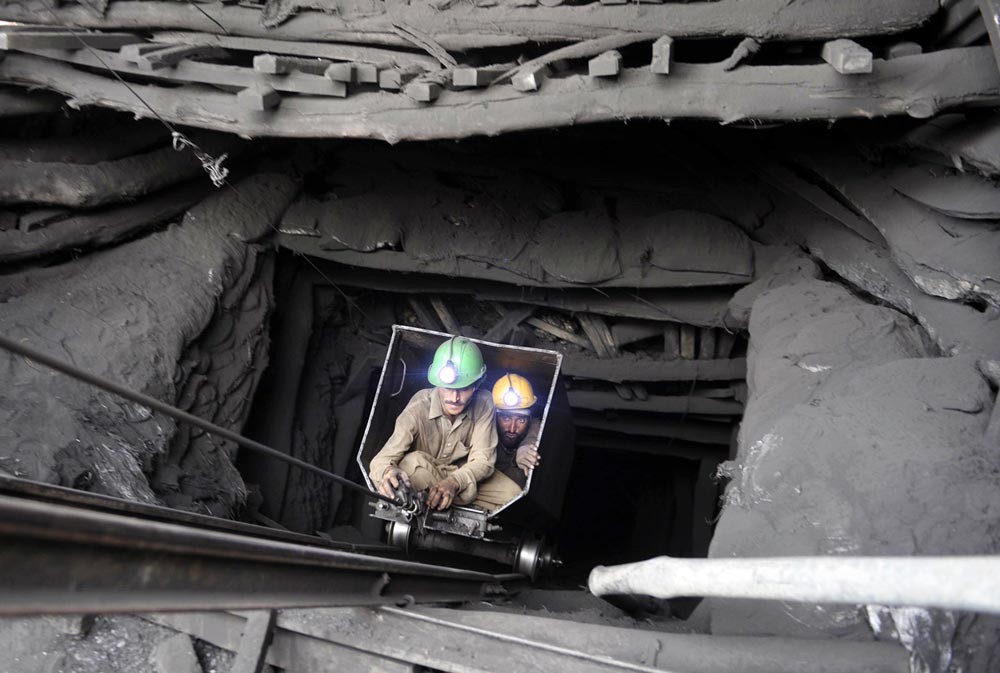
Security tax and demand for local lease ownership proving a stumbling block in production of Harnai Coalmines

As a sequel to my previous article on Harnai Coalmines Project, the current one sheds light on political discourse relating to the project, underlying reasons for low production of coal in Harnai and possible remedies to settle or at least manage the related issues.
Reservations from Pashtunkhwa Milli Awami Party (PkMAP) -- a coalition partner in the incumbent provincial government -- regarding Frontier Corps’s security agreements with coalmines companies in Khost and imposition of exorbitant taxes per ton of coal in Harnai district are hindering the maximum production of coal in the resource rich but backward district.
A copy of letter seen by the author -- dated January 14, 2015 -- was addressed to the then IG FC by Home Secretary Balochistan on the direction of the incumbent chief minister. Citing "reservation and dissatisfaction on the subject agreement shown [by] the coalition partners [read PkMAP]," and "that such agreement without the consultation of the local representatives of the area and provincial government might lead to misunderstanding and create mistrust at the provincial level," the CM "directed that the subject agreement may be revoked," the letter stated.
In another letter dated Feb 24, 2015 and addressed to FC Headquarters Balochistan, an additional secretary refers to a cabinet meeting held on February 10, which had "reiterated that the agreement executed between Frontier Corps and coalmine owners of District Harnai is not valid due to the reason that the political leadership of the area was not taken on board." Without citing any higher authority, the letter states, "the FC post established for the levy of tax on the coalmine owners may please be removed with immediate effect."
"FC’s continued stay on Harnai coalmines despite provincial government’s serious reservation is a flagrant violation of provincial autonomy as guaranteed under 18th amendment," stated Usman Kakar, PkMAP president Balochistan chapter and party’s senator and chairperson senate functional committee on problems of less developed areas. "5,000 tons of coal is dug out every day from around 250 coalmines," he guessed. "Additionally, these mines employ 40,000-50,000 labourers including 200 contractors," the senator continued. "With Pakistan Mineral Development Corporation charging no less than one thousand rupees per ton under various taxes why should FC levy additional Rs 220 tax per ton," he asked. "I discussed the issue with the interior minister but he looked the other way," Kakar wondered in disappointment.
When I asked for reason(s) of his party’s opposition to security agreements, the senator remarked, "These agreements mainly give protection to three coalmine owners who are not local people. Ulas (people) opposed Sheikh Islam’s ownership of coalmines not because he was from Punjab but because he was a local of neither Harnai nor Khost," he added. When I asked for the PkMAP’s demand(s) to resolve the crisis, Usman Kakar said, "We have two demands. First, in Khost, give coal lease ownership to local people. Secondly, abolish Rs220 security tax. The FC should demand security charges from provincial government rather than coalminers," Kakar concluded.
In Harnai, people recall how thousands of people were employed when coal production was at its peak back until 2001. With BLA danger as a threat to coalmines operation virtually non-existent, a search for the factors of lower production of coal in Harnai district reveals three underlying reasons. First, the caving in of the coalmines in Khost -- the hub of quality coal production. Secondly, PkMAP’s opposition to FC’s provision of security to coalmines operation that discourages the contractors in Harnai district from investing in coal business fearing the revoking of these agreements. Third, exorbitant taxation is discouraging investment in coalmines business.
A number of measures are necessary for the higher production of coal in Harnai district. First, that major beneficiaries of the economic dividends, in terms of coalmines ownership, should be locals is as rational a demand as it is constitutional and moral. Generally, local population tends to invest locally than the outsiders who generally exploit at the expense of the local inhabitants. Secondly, tax levied on per ton of coal should be minimized. The government collects Rs1160 under various heads: GST (Rs475), excise duty (Rs10), Mines and Minerals Development royalty (Rs70), employees old age benefits institute fund (Rs5), PMDC charges (Rs600).
On the other hand, FC collects a total of Rs220 on multiple heads: security (50 per cent), education (20 per cent), health (15 per cent) and social development (15 per cent). When combined with weighing charges (nearly Rs10 per ton), it costs Rs1390 per ton of coal production. When labour cost is included -- from Rs3600-4000 -- cost per ton of coal reaches a whopping Rs4990-55490!
At least there should be tax differentiation. Currently, there are uniform charges on all qualities of coal, which in terms of quality range from top to middle to third and other categories. "The market price of other category is Rs4000 and it is impossible to dig coal out with so many taxes imposed on it," lamented a contractor.
The government, learning from the FC’s experience, should spend on welfare work in the district. Last but not least important is that the government should ensure the safety of coalmine labourers to encourage coalmining by the local people. "Hundred per cent labourers are either Afghani or people from Swat," stated a contractor. "Whenever a coalmine collapses, it takes a day for the rescue team to reach from Quetta only to retrieve dead bodies buried under heavy debris as no one survives after too much delay in the rescue work," complained a labourer. When I asked a concerned FC officer if his institute could extend a helping hand to the poor labourers, he said "we just need technical team to operate rescue operation as we will ensure the availability of required machinery."